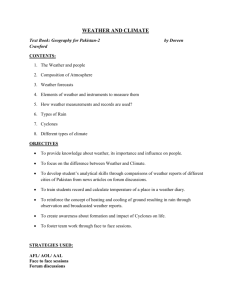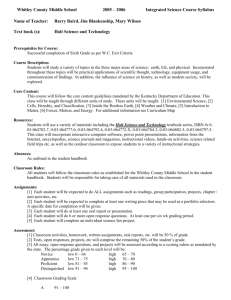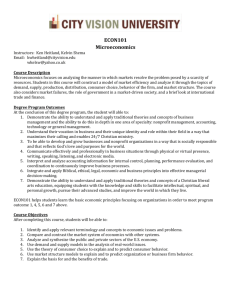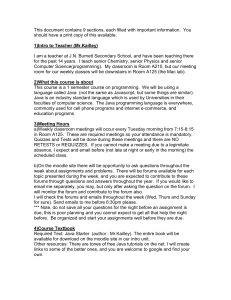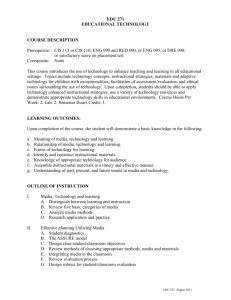Instructors - EdTech - Boise State University
advertisement
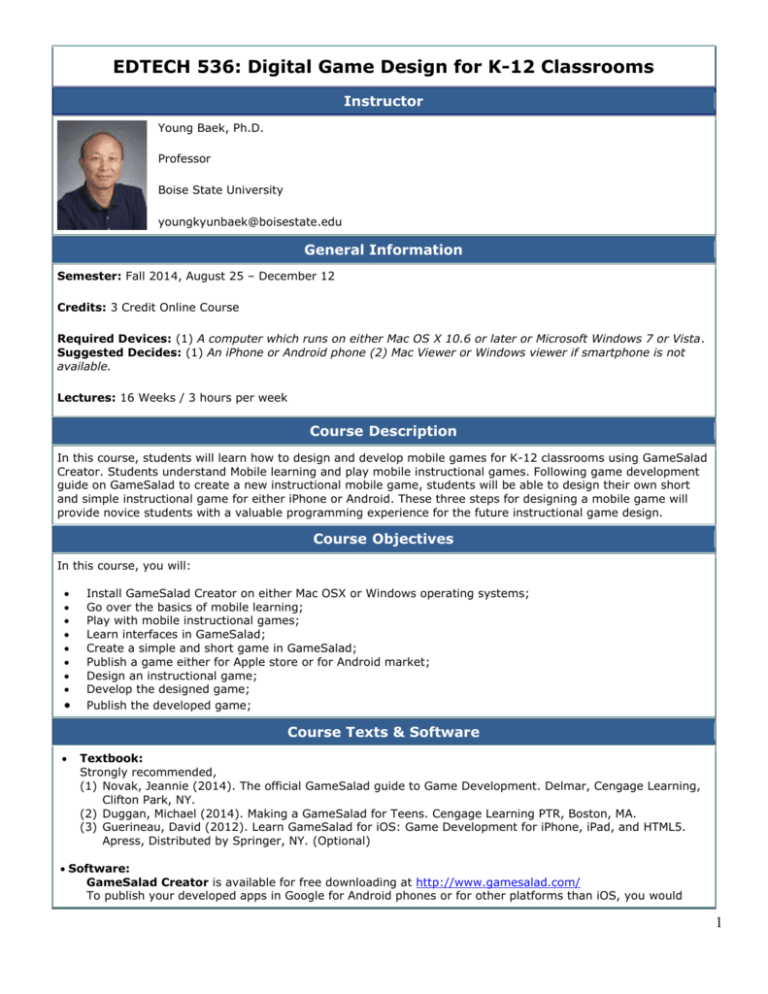
EDTECH 536: Digital Game Design for K-12 Classrooms Instructor Young Baek, Ph.D. Professor Boise State University youngkyunbaek@boisestate.edu General Information Semester: Fall 2014, August 25 – December 12 Credits: 3 Credit Online Course Required Devices: (1) A computer which runs on either Mac OS X 10.6 or later or Microsoft Windows 7 or Vista. Suggested Decides: (1) An iPhone or Android phone (2) Mac Viewer or Windows viewer if smartphone is not available. Lectures: 16 Weeks / 3 hours per week Course Description In this course, students will learn how to design and develop mobile games for K-12 classrooms using GameSalad Creator. Students understand Mobile learning and play mobile instructional games. Following game development guide on GameSalad to create a new instructional mobile game, students will be able to design their own short and simple instructional game for either iPhone or Android. These three steps for designing a mobile game will provide novice students with a valuable programming experience for the future instructional game design. Course Objectives In this course, you will: Install GameSalad Creator on either Mac OSX or Windows operating systems; Go over the basics of mobile learning; Play with mobile instructional games; Learn interfaces in GameSalad; Create a simple and short game in GameSalad; Publish a game either for Apple store or for Android market; Design an instructional game; Develop the designed game; Publish the developed game; Course Texts & Software Textbook: Strongly recommended, (1) Novak, Jeannie (2014). The official GameSalad guide to Game Development. Delmar, Cengage Learning, Clifton Park, NY. (2) Duggan, Michael (2014). Making a GameSalad for Teens. Cengage Learning PTR, Boston, MA. (3) Guerineau, David (2012). Learn GameSalad for iOS: Game Development for iPhone, iPad, and HTML5. Apress, Distributed by Springer, NY. (Optional) Software: GameSalad Creator is available for free downloading at http://www.gamesalad.com/ To publish your developed apps in Google for Android phones or for other platforms than iOS, you would 1 purchase the necessary package from the website. Useful Sites for this Course http://www.gamesalad.com/ http://www.cengage.com http://gsanimator.com/ http://gshelper.com/ http://lionsgames.net Schedule and Assignments Course Schedule The syllabus and schedule maybe adapted depending on the needs of the class. Topics Module 1 Introduction to the Course & Basics of GameSalad (Week 1) 1. Course Orientation 2. Mobile Learning Introduction 3. Understand Game genre 4. Set up GameSalad Creator on Mac OS or Windows. Date 8/25-8/31 Module 2 Play Mobile games & a Trial Run (Week 2) 1. Analysis of mobiles games in education 2. Mobile games design process 3. GameSalad interface 4. Outline your final project 9/1-9/7 Module 3 Create & Publish your short App (Week 3-4) 1. A walkthrough 2. Publishing 9/8-9/21 Module 4 Project 1 Creating App with movement and control (Week 5-6) 1. Objects movement 2. Objects behavior Control Module 5 Project 2 Pop-Up References and Tables/Creating quiz (Week 7-9) 1. Quiz 2. Table Module 6 Project 3, Developing Adventure App Game (Week 10-11) 1. An idea sheet for an adventure game 2. Content analysis for your game 3. Your storyboard 9/22-10/5 10/6-10/26 10/27-11/09 Activities Read syllabus and explore course materials Get an overview of the course Read and understand the concept of Mobile Learning Read and understand the game genres Participate in the discussion forum Install GameSalad Creator on your machine Play mobile games and reflect what educational potentials they have Read mobile game design & Understand design process Get ideas of whole process of design and publish Explore GameSalad interface Sketch your final project (1): Draft 1 Create your first Program Test a short app on your phone (or simulator) Publish the App Try and test object movements: right, left, up and down; jump; animation Create a template which contains movement & control, including a simple animation, Timer, and Pause Submit project 1 Revise your final project (2): Draft 2 Create quizzes Create a Table and manage input/output Submit your Quiz Submit project 2 Revise your final project (3): Draft 3 Create an idea sheet and story board Submit project 3 Revise your final project (4): Draft 4 2 Module 7 Final Project and Publishing (Week 12-15) 1. Submit the final project 2. Write a lesson plan 3. Video Presentation 4. Design Sheet 11/10-12/12 Week 12 to Week 15 Design and Develop games (Scripts) Week 14 Thanksgiving Holiday No Class Week 15 Present games (Videos) Week 15 Submit a lesson plan Submit your design sheet Posting of Assignments: Detailed information about assignments will be posted in Moodle. Assignments begin on every Monday, and are typically due the following Tuesday as posted. See the agenda of each week to access this information in each module. Assignment and project information will be updated regularly throughout the semester. Please check Moodle at least once a week to read announcements and check for assignment updates. Also, check your email once a week for course related correspondence. Note that the default email address in Moodle is your BSU email address. Please check your personal information in Moodle to see if the email address listed there is the one you with to be contacted with. If not, please change it right away. Be aware that the university “recommends that you plan on 3-4 hours of course work per credit per week for Distance Ed classes. For example, a 3-credit class would require 9-12 hours of your time per week (BSU Distance Education).” Assignment Submission: All assignments must be submitted by Tuesday on the assigned due dates in your assignment. Assignments will be submitted in various formats whether it is via Discussion Forum, Email, or posting to our student websites, etc. The methods will be outlined in each assignment. Here is a list of the assignments and projects for this semester: Assignments Type Module 1 Introduction to the Course (Week 1) Points 50 Post an introductory message Discussion Forum 20 Reflect on Mobile Learning Discussion Forum 30 Module 2 Play Mobile games & a Trial Run (Week 2) Reflect on what you have learned from playing mobile games Submit your short trial program Outline your finial project (1st draft) Publish your app Discussion Forum 30 Upload a file 50 Discussion Forum 50 Discussion Forum 60 70 9/08 9/08 9/10 9/17 9/22 110 Upload a file 70 Revise your final project design (2nd draft) Discussion Forum 30 Respond two other colleagues’ 2nd draft of final project Discussion Forum 10 Module 5 Project 2 (Week 7-9) 9/01 130 Upload a file Module 4 Project 1 (Week 5-6) Submit your complete project 1 9/01 130 Module 3 Create & Publish your short App (Week 3-4) Submit your complete app Due Date 10/06 10/06 10/08 110 3 Submit your Quiz Discussion Forum 30 Submit your complete project 2 Discussion Forum 60 Revise your final project design (3rd draft) Discussion Forum 10 Respond two other colleagues’ 3nd draft of final project 10 Module 6 Project 3 (Week 10-11) 10/13 10/27 10/28 10/30 110 Upload a file Submit your complete project 3 Discussion Forum Revise your final project design (4th draft) Respond two other colleagues’ 4th draft of final project 80 20 10 Module 7 Final Project and Publishing (Week 12-15) 11/11 11/11 11/13 360 Discussion Forum 50 Submit Lesson Plan Upload a file 50 Submit final project Discussion Forum 200 Submit Video Presentation Discussion Forum 50 Course Evaluation Survey Discussion Forum 10 Submit Design sheet 11/25 12/02 12/09 12/09 12/10 1000 Accommodations: To request academic accommodations for a disability, contact the Office of Disability Services, Admin 114, (208) 426-1583. Students are required to provide documentation of their disability and meet with a Disability Specialist prior to receiving accommodations. Information about a disability or health condition will be regarded as confidential. Faculty Initiated Drop: Please be advised that if you do not attend class at least once during the first week, you will be dropped from class. Grades Each assignment will be graded based on identified criteria. You can check your progress in Moodle by clicking the “Grades” link on the left-hand navigation bar. Progress is updated as assignments are evaluated throughout the semester. Your final grade will be based on the following scale: Total: 1000 points A+ 97% ~ 100% (970 ~ 1000) A 93% ~ 96% (930 ~ 969) A- 90% ~ 92% (900 ~ 929) B+ 87% ~ 89% (870 ~ 899) B 83% ~ 86% (830 ~ 869) B- 80% ~ 82% (800 ~ 829) C+ 77% ~ 79% (770 ~ 799) C 73% ~ 76% (730 ~ 769) 4 C- 70% ~ 72% (700 ~ 729) D+ 67% ~ 69% (670 ~ 699) D 63% ~ 66% (630 ~ 669) D- 60% ~ 62% (600 ~ 629) E 599 and below Course Policies Communication – The instructor will respond to emails and/or phone calls usually within 24 hours on weekdays, but this may be longer on a weekend or with advance notice to students. Posting of Assignments- Major assignments will be posted at least one week in advance of the assignment due date. Assignment Submissions - Details about assignments will be posted to Moodle in the each week agenda, which will be available the week before. Information about projects, submission guidelines and rubrics will be updated throughout the course, and in response to feedback. Assignments will normally due for submission on Tuesday night at midnight. Feedback/grades- Students must be informed of their progress toward the final course grade at regular intervals. Assignments will be reviewed and evaluated by the instructor within one week after the posted assignment due date. Late assignments- All assignments should be submitted at the designated time, unless pre-arranged with the instructor. The instructor is not responsible for any text or software that is not obtained in enough time to complete the assignments. Technical Difficulties- on occasion, you may experience problems with accessing Moodle or class materials located within Moodle, with your Internet service, and/or other computer related problems. Do make the instructor aware if a technical problem prevents you from completing coursework. BroncoMail - http://helpdesk.boisestate.edu/email/broncomail/ Moodle Assistance -http://edtech.mrooms.org Academic Honesty -All students are required to abide by Boise State University's Student Code of Conduct on academic dishonesty. Assignments completed must be your original work and cannot be used in other courses in the EdTech program. Reasonable Accommodations - Any student who feels s/he may need accommodations based on the impact of a disability should contact the instructor privately to discuss specific needs. It is advisable to contact the Disability Resource Center at 208-426-1583 located in the Administration Building, room 114 to meet with a specialist and coordinate reasonable accommodations for any documented disability. Boise State's FERPA policy - The Family Educational Rights and Privacy Act (FERPA) affords students certain rights with respect to their education records. http://registrar.boisestate.edu/catalogs/ugrdcurrent/frontpages/chapter2/confidentiality.shtml Conceptual Framework College of Education - The Professional Educator Boise State University strives to develop knowledgeable educators who integrate complex roles and dispositions in the service of diverse communities of learners. Believing that all children, adolescents, and adults can learn, educators dedicate themselves to supporting that learning. Using effective approaches that promote high levels of student achievement, educators create environments that prepare learners to be citizens who contribute to a complex world. Educators serve learners as reflective practitioners, scholars and artists, problem solvers, and 5 partners. Department of Educational Technology Mission The Department of Educational Technology supports the study and practice of facilitating and improving learning of a diverse population by creating, using, managing, and evaluating appropriate technological processes and resources. Believing technology is a tool that enhances and expands the educational environment, we promote the use of current and emergent technologies for teaching and learning in a dynamic global society. Educational technologists are leaders and innovators, serving in institutions of higher education, public or private school settings, federal, state, or local educational agencies, and educational organizations in the private sector. AECT Standards AECT Standards-Standards listed with assessments tied to standards. Standard 1: DESIGN 1.1 Instructional Systems Design (ISD) "Instructional Systems Design (ISD) is an organized procedure that includes the steps of analyzing, designing, developing, implementing, and evaluating instruction” Outline your final project 1.2 Message Design "Message design involves planning for the manipulation of the physical form of the message” Revise and update your design for the final project 1.3 Instructional Strategies "Instructional strategies are specifications for selecting and sequencing events and activities within a lesson" Module 4 Program with Graphic and sprites Module 4 Design User Interface Module 3 Button and Text 1.4 Learner Characteristics "Learner characteristics are those facets of the learner's experiential background that impact the effectiveness of a learning process" Standard 2: DEVELOPMENT 2.1 Print Technologies "Print technologies are ways to produce or deliver materials, such as books and static visual materials, primarily through mechanical or photographic printing processes" 2.2 Audiovisual Technologies "Audiovisual technologies are ways to produce or deliver materials by using mechanical devices or electronic machines to present auditory and visual messages" Module 3- Module 6 2.3 Computer-Based Technologies "Computer-based technologies are ways to produce or deliver materials using microprocessor-based resources" 2.4 Integrated Technologies “Integrated technologies are ways to produce and deliver materials which encompass several forms of media under the control of a computer” Final Project Lesson Plan Standard 3: UTILIZATION 3.1 Media Utilization 3.1.1 Identify key factors in selecting and using technologies appropriate for learning situations specified in the instructional design Module 3- Module 6 6 process. 3.1.2 Use educational communications and instructional technology (SMETS) resources in a variety of learning context. Standard 4: MANAGEMENT 4.0 Management “Management involves controlling Instructional Technology through planning, organizing, coordinating, and supervising” 4.3 Delivery System Management “Delivery system management involves planning, monitoring and controlling ‘the method by which distribution of instructional materials is organized’ . . . [It is] a combination of medium and method of usage that is employed to present instructional information to a learner” Lesson Plan Video Presentation Final Project Standard 5: EVALUATION 5.3 Formative and Summative Evaluation “Formative evaluation involves gathering information on adequacy and using this information as a basis for further development. Summative evaluation involves gathering information on adequacy and using this information to make decisions about utilization” Video Presentation 7

